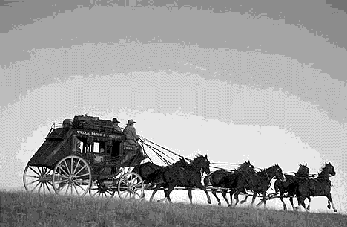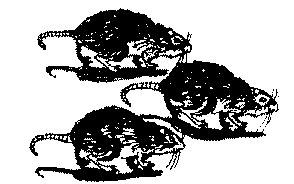Curmudgeon's Cookery - American Anecdotes
![]()
 Stagecoach Station Fare.
"The table was a greasy board on stilts, and the table-cloth and napkins
had not come--and they were not looking for them, either. A battered tin
platter, a knife and fork, and a tin pint cup were at each man's place...
Stagecoach Station Fare.
"The table was a greasy board on stilts, and the table-cloth and napkins
had not come--and they were not looking for them, either. A battered tin
platter, a knife and fork, and a tin pint cup were at each man's place...
There was only one cruet left, and that was a stopperless, fly-specked,
broken-necked thing, with two inches of vinegar in it, and a dozen preserved
flies with their heels up and looking sorry they had invested there.
The station-keeper up-ended a disk of last week's bread, of the shape and size
of an old-time cheese, and carved some slabs from it which were as good as
Nicholson pavement, and tenderer. He sliced off a piece of bacon for each man,
but only the experienced old hands made out to eat it, for it was condemned army
bacon which the United States would not feed to its soldiers in the forts, and
the stage company had bought it cheap...
Then he poured for us a beverage which he called 'Slumgullion,' and it is hard
to think he was not inspired when he named it. It really pretended to be tea,
but there was too much dish-rag, and sand, and old bacon-rind in it to deceive
the intelligent traveler..We could not eat, and there was no conversation among
the hostlers and herdsmen--we all sat at the same board...We gave up the
breakfast, and paid our dollar apiece and went back to our mail-bag bed in the
coach, and found comfort in our pipes." Roughing It Mark
Twain
Butterfield Trail. One of the early travelers on the Butterfield
Trail was Waterman Ormsby, a reporter for the New York Herald. The
Wells Fargo history web page has this account of Mr. Ormsby's breakfast at the
Connolly Station in Texas Territory:
"The station was a log house,
haphazardly thrown together. Inside the twenty square-foot structure, the
travelers were met by two men living a grubby bachelor's existence. The coach
arrival was unexpected, and the men scrambled to get breakfast ready.
When the food came, it was served on the bottom of a candle box. The little
breakfast club seated themselves on upside-down pails. There were no plates,
only tin cups for coffee, and not even a suggestion of milk or sugar. The only
"edible" was a short cake, baked on coals. Each man broke off a piece
and smothered it with butter using their pocket knives. . . To add to the
ambience, the host reminded them to 'hurry up before the chickens eat
it.'"
The Customers Saw Nothing. "It was amusing to look round the
filthy little scullery and think that only a double door was between us and the
dining-room. There sat the customers in all their splendour--spotless
table-cloths, bowls of flowers, mirrors and gilt cornices, and painted cherubim;
and here, just a few feet away, we in our disgusting filth.
For it really was disgusting filth. There was no time to sweep the floor till
evening, and we slithered about in a compound of soapy water, lettuce-leaves,
torn paper and trampled food. A dozen waiters with their coats off, showing
their sweaty armpits, sat at the table mixing salads and sticking their thumbs
into the cream pots....But the customers saw nothing of this." From Down
and Out in Paris and London by George Orwell, describing conditions in
an early l930's Paris hotel kitchen.
The Excrement of a Million Ducks. In her book Serve it Forth M.F.K.
Fisher reports on a restaurant kitchen visited in the l930's:
"The floor, slick and black, is uneven where dishtowels and utensils have
been half-swallowed in its eternal ooze. Water from the grease-ridged sink runs
over it in iridescent trickles, and crusts of bread and slippery wilted
lettuce-scraps lie everywhere, never too trodden for the rats of dawn.
Up from the floor and in and down from the foul walls and ceiling seeps a smell
more evil and obscene than Mr. Webster dreamed of. It is acrid and heavy, a
slippery, dark grey smell, like the piled-up excrement of a million
ducks..."
The rather gross preceding snippet does not adequately represent a fine
author. M.F.K. Fisher (1908-1992) had a long and successful career crafting
prose on food. Bibliographer Joan Reardon (M.F.K. Fisher, Julia Child
& Alice Waters: Celebrating the Pleasures of the Table) writes:
"M.F.K. Fisher created a rhetoric of food and subtly challenged all those
who followed her 'at the hot literary cookstove of gastronomical comment' to
weigh every word they wrote with care, and she bequeathed the habit of recalling
past pleasures of feasts, great and small, especially in those times of inner
drought and stress."
You can find Fisher's early books in The Art of Eating.
Interesting book chapters include "How to Boil Water" and "How to
Distribute Your Virtue." For the more erudite, she prepared the fine
translation of Brillat-Savarin's The Physiology of Taste.
 Rat Sausage. "There was never the least attention paid to what
was cut up for sausage; there would come all the way back from Europe old
sausage that had been rejected, and that was moldy and white--it would be dosed
with borax and glycerine, and dumped into the hoppers, and made over for home
consumption.
Rat Sausage. "There was never the least attention paid to what
was cut up for sausage; there would come all the way back from Europe old
sausage that had been rejected, and that was moldy and white--it would be dosed
with borax and glycerine, and dumped into the hoppers, and made over for home
consumption.
There would be meat that had tumbled out on the floor, in the dirt and sawdust, where the workers had tramped and spit uncounted billions of consumption germs. There would be meat stored in great piles in rooms; and the water from leaky roofs would drip over it, and thousands of rats would race about on it. It was too dark in these storage places to see well, but a man could run his hand over these piles of meat and sweep off handfuls of the dried dung of rats.
These rats were nuisances, and the packers would put poisoned bread out for them; they would die, and then rats, bread and meat would go into the hoppers together. This is no fairy story and no joke; the meat would be shovelled into carts, and the man who did the shovelling would not trouble to lift out a rat even when he saw one--there were things that went into the sausage in comparison with which a poisoned rat was a tidbit." Chapter 14, The Jungle by Upton Sinclair, 1906.
While the Jungle was a novel, many believed that the Chicago meat packing house descriptions had more than kernels of truth present. Fearing a lawsuit, the original publisher Doubleday, Page and Company conducted an independent investigation that supported the author's colorful prose. The federal government also investigated and reported adverse findings to the 59th Congress. The Jungle's descriptions of rat contaminated food and other very unsavory practices led to the adoption of federal laws requiring the inspection of meat packing plants.
Kermit McKemie mailto:kmckemie@astound.net